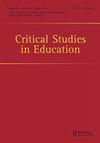Investing in imagined digital futures: the techno-financial ‘futuring’ of edtech investors in higher education
IF 2.7
2区 教育学
Q1 EDUCATION & EDUCATIONAL RESEARCH
引用次数: 11
Abstract
ABSTRACT Educational technology is the focus of increasing financial investment. In this article, we examine how edtech investors imagine and invest in the future of higher education through an empirical case study of a UK investing company. Utilising concepts and methods from economic sociology, we analyse how investment companies engage in techno-financial ‘futuring’ practices. We identify two kinds of futuring practices. First, investors’ imaginary practices produce qualitative ‘fictional expectations’ about the future of education, supported by quantitative financial valuation practices that predict the monetary returns on investment available from funding edtech. Second, we analyse the specific investment-supporting operations of edtech investors, highlighting how imagined futures of education are funded into existence (or not) as investors select and support edtech products or services. In these ways, imaginaries of the future may be materialised in educational institutions through financial investments in specific edtech products. We particularly trace how investment imaginaries and operations shift from edtech markets as selling commodities to edtech industry controlling digital products and resources as assets. Therefore, the two identified complementary futuring practices function as processes of ‘assetisation’, aimed at turning educational services and resources into digital assets with calculable future value for edtech investors.投资想象中的数字未来:高等教育中教育技术投资者的技术金融“未来”
教育技术是财政不断增加投入的重点。在本文中,我们通过对一家英国投资公司的实证案例研究,研究了教育科技投资者如何想象和投资高等教育的未来。利用经济社会学的概念和方法,我们分析了投资公司如何参与技术金融“未来”实践。我们确定了两种未来的实践。首先,投资者的想象实践产生了对教育未来的定性“虚构预期”,并得到定量金融估值实践的支持,这些实践预测了投资教育科技的货币回报。其次,我们分析了教育科技投资者的具体投资支持操作,强调了当投资者选择和支持教育科技产品或服务时,想象中的教育未来是如何被资助存在(或不存在)的。通过这些方式,对未来的想象可以通过对特定教育技术产品的金融投资在教育机构中实现。我们特别追踪了投资想象和运营如何从销售商品的教育科技市场转变为将数字产品和资源作为资产控制的教育科技行业。因此,这两个互补的未来实践作为“资产化”的过程,旨在将教育服务和资源转化为具有可计算未来价值的数字资产,为教育科技投资者提供服务。
本文章由计算机程序翻译,如有差异,请以英文原文为准。
求助全文
约1分钟内获得全文
求助全文
来源期刊

Critical Studies in Education
EDUCATION & EDUCATIONAL RESEARCH-
CiteScore
10.10
自引率
5.10%
发文量
18
期刊介绍:
Critical Studies in Education is one of the few international journals devoted to a critical sociology of education, although it welcomes submissions with a critical stance that draw on other disciplines (e.g. philosophy, social geography, history) in order to understand ''the social''. Two interests frame the journal’s critical approach to research: (1) who benefits (and who does not) from current and historical social arrangements in education and, (2) from the standpoint of the least advantaged, what can be done about inequitable arrangements. Informed by this approach, articles published in the journal draw on post-structural, feminist, postcolonial and other critical orientations to critique education systems and to identify alternatives for education policy, practice and research.
 求助内容:
求助内容: 应助结果提醒方式:
应助结果提醒方式:


